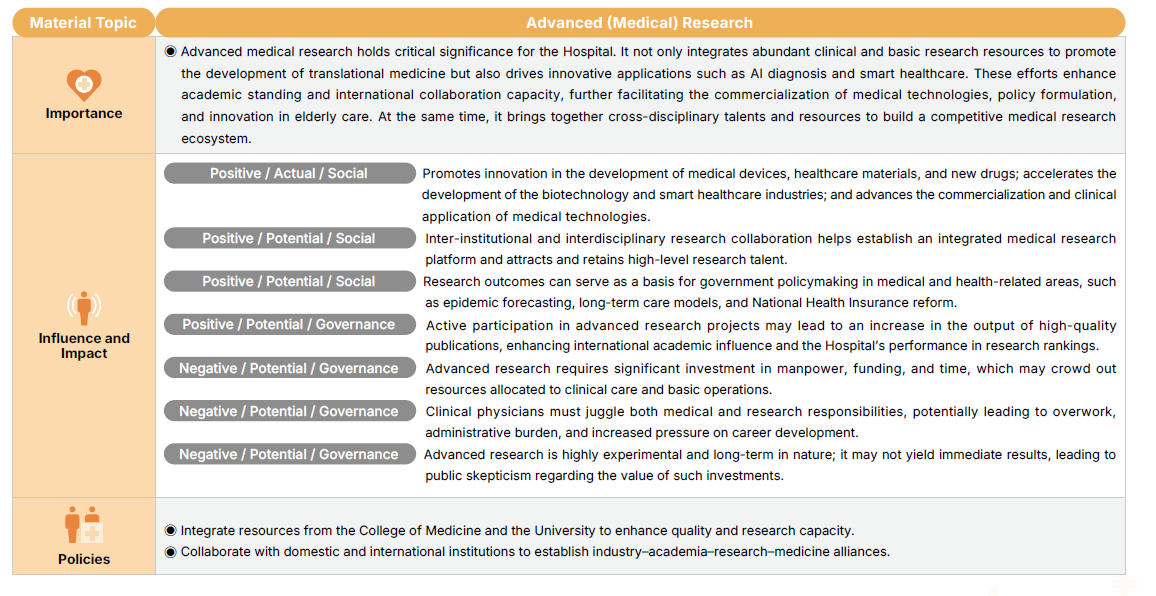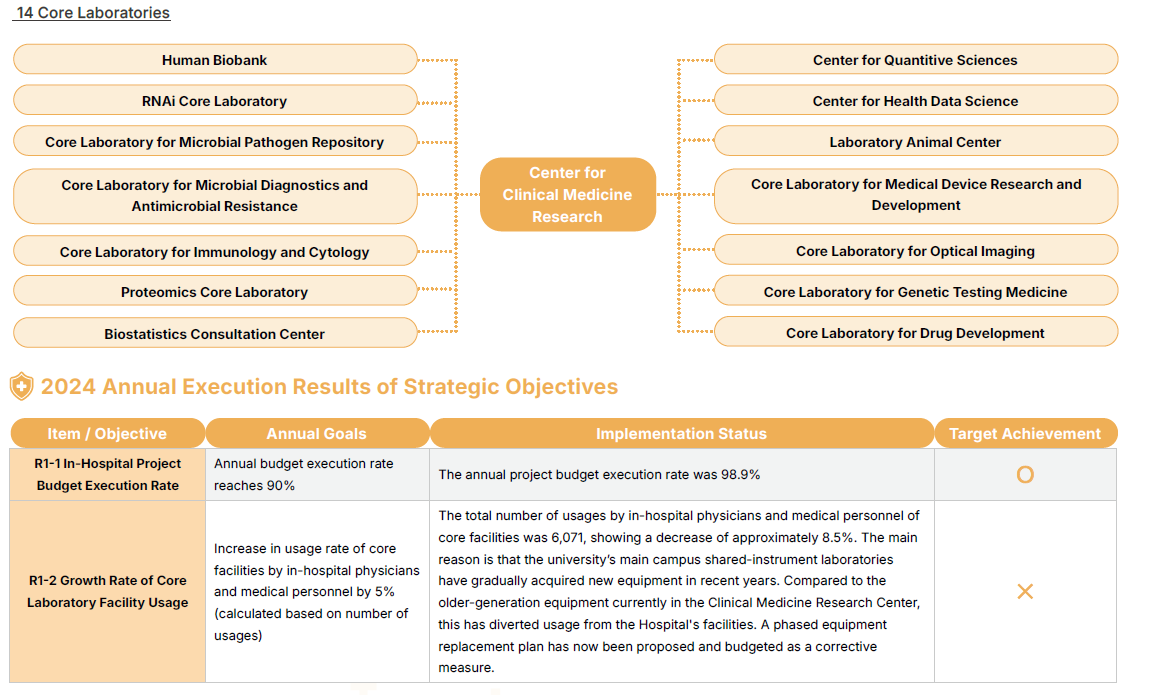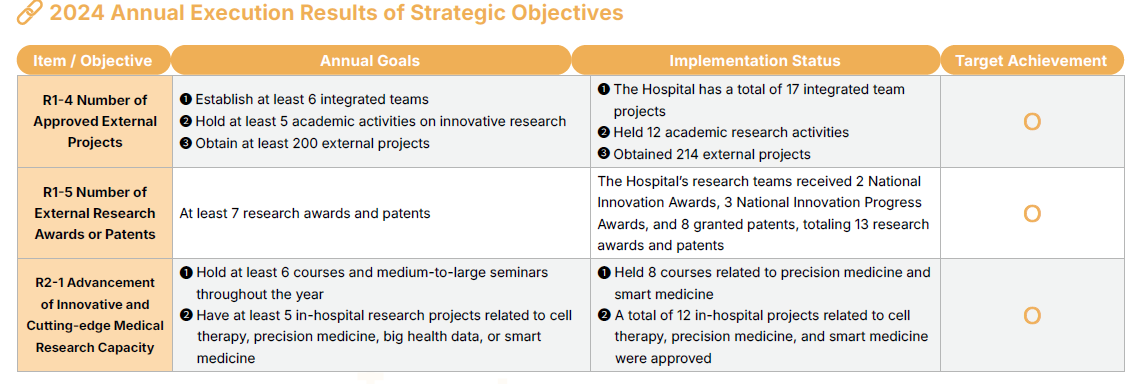Advanced Medical Research
Advanced Medical Research


Clinical and Translational Medical Research
-
Academic and Clinical Resource Complementarity
As a teaching hospital, the Hospital places equal emphasis on research, education, and medical services. As the affiliated medical institution of the NCKU College of Medicine, it works in close collaboration with the College to jointly establish a comprehensive system for clinical and academic research, promoting the development of medical research in Taiwan and enhancing the level of medical technology. By leveraging the diverse and abundant clinical cases at the medical center and the multidisciplinary medical teams, and combining them with the research capabilities from the College in basic medical science, public health, pharmacy, biotechnology, and information technology, it accelerates the translation of basic theoretical research into practical application—realizing the translational medical goal of “identifying problems in the clinic, finding answers through research, and returning to the clinic to improve care.”
Attending physicians in the Hospital with a research motivation may pursue a master’s or doctoral degree at the Institute of Clinical Medicine of the College of Medicine, under the joint guidance of professors from the College and clinical mentors, thereby shaping academic talents with both clinical insight and research capabilities. Conversely, students and researchers from the College can leverage the clinical resources of NCKU Hospital for data collection, case analysis, and field validation. Through this two-way complementary mechanism, the Hospital has become a core hub for clinical research and academic innovation in southern Taiwan.

To continuously develop translational medical research that focuses on solving clinical diseases or developing new treatments and extends to fundamental research, as well as to cultivate future research leaders from both the hospital and the medical school through a team-based approach, the Hospital has established a Clinical Research Talent Development Program. This program aims to discover and nurture outstanding clinical medical research talent, with senior researchers forming teams to lead young attending physicians in conducting research, thereby enhancing the Hospital’s research competitiveness and improving research quality.
In addition, the Hospital has established the “Incentive Guidelines for Research Paper Publication” to encourage staff to conduct academic research and publish in international journals, thereby raising the standard of medical research at the Hospital. In 2024, a total of 274 journal articles were published (including 20 first-time publications in international journals), and 126 academic conference paper applications were submitted. As the topic of mega journals has drawn increasing attention in recent years, universities and the University’s main campus have implemented related promotion guidelines and adopted stricter “substantive journal review” mechanisms. Excluding adjunct and National Health Research Institutes (NHRI) joint-appointed personnel, the Hospital recorded 89 papers in 2024 with an impact factor (IF) greater than 5 published by first authors, corresponding authors, or authors who are both.
-
2024 Annual Execution Results of Strategic Objectives

-
Supporting In-Hospital Research
To integrate research-related software and hardware resources and enhance the quality and efficiency of clinical research, the Hospital has established a Clinical Medical Research Center and set up 14 core laboratories. It has employed 15 technicians and administrative staff and allocated an annual budget of NT$5 million for the maintenance of high-value instruments and NT$7.1 million for laboratory consumables to ensure the normal operation of core/shared laboratories.
In addition, a research consultation platform has been established, where senior professors from National Cheng Kung University, research-based attending physicians of the Hospital, and PhD-level researchers provide consulting services on paper writing and project planning. This platform supports hospital colleagues in research design, manuscript writing, and journal submission. Furthermore, training courses on academic writing and project proposal development are held to strengthen the Hospital’s research capabilities.

The Clinical Medicine Research Center distributes a quarterly e-newsletter to introduce the Hospital’s core facilities and research resources. It has also established an “Online Digital Learning Platform” and regularly holds equipment training courses to actively expand its user base, aiming to improve the utilization rate of equipment and increase research paper output. In 2024, a total of 39 equipment training and certification sessions were held. The number of in-hospital physicians and medical personnel using the core facilities reached 6,071, representing an 8.5% decrease compared to 2023. Upon review, the main reason for this decline was that the university's main campus shared-instrument laboratories have recently acquired newer models, while the research equipment in the Clinical Medicine Research Center consists largely of older-generation devices. As a corrective measure, a phased equipment replacement plan has been proposed and budgeted.
-
2024 Annual Execution Results of Strategic Objectives

Tri-Partite Collaboration among Academia, Research, and Medicine
-
Interdisciplinary Integrated Projects
In 2024, the Hospital subsidized a total of 348 in-hospital research projects. In addition to the traditional “individual research” model, and in order to “encourage senior researchers to mentor young researchers in actively engaging in clinical and translational medical research and to stimulate the Hospital’s research culture,” a budget of NT$122.9 million was allocated to support the in-hospital “Future Star Cultivation,” “Forward-Looking Integrated,” and “Non-Integrated” projects. These initiatives aim to nurture outstanding in-house teams and position integrated projects as pilot studies for future large-scale external grants. This also prepares for cross-hospital and cross-university integrated teams and encourages the Hospital’s physicians and medical personnel to identify problems from clinical practice and seek collaborative research solutions with faculty members from National Cheng Kung University’s basic medical sciences and other interdisciplinary teams, thereby cultivating national integrated project teams.
To develop internationally distinctive medical specialties and to secure high-level external research collaborations (such as those from the National Science and Technology Council and the National Health Research Institutes), the Hospital allocated NT$50 million for hospital-designated special research projects(Top-Down). These projects aim to integrate research and clinical care, identify outstanding and impactful clinical studies, and pioneer new therapeutic fields. Meanwhile, the Hospital continues to appoint project review committee members and invites relevant experts to form an integrated project review panel responsible for supervising and evaluating the progress and future development potential of various projects. According to statistics, the Hospital had a total of 50 interdisciplinary collaborative in-hospital projects and co-published 85 research papers with international partners in 2024.
-
Establishing an Intercollegiate Biotechnology Research Network
The Hospital actively integrates the academic research capacity of various colleges at National Cheng Kung University to conduct collaborative research projects across colleges and departments, fostering innovative research outcomes. The Clinical Research Center also assists research teams in participating in external competitions or applying for patents. In 2024, a total of 8 patents were granted, 2 teams received the 21st National Innovation Award, and 3 teams received the 2024 National Innovation Progress Award.
To stimulate internal momentum for innovative research, the Clinical Research Center regularly organizes innovation research activities in hopes of forming more interdisciplinary research teams, thereby achieving goals related to industry-academia collaboration and patent application. In addition, the Hospital continues to collaborate with external organizations, leveraging the resources of inter-institutional teams to enhance the quality and standing of its clinical medical research and contribute to the improvement of national healthcare quality. In 2024, the Hospital received a total of 156 grants from the National Science and Technology Council (including multi-year projects), 6 projects from the National Health Research Institutes, 26 projects from the Ministry of Health and Welfare and affiliated agencies, 12 collaborative projects with other hospitals, and 14 projects from other institutions. Additionally, the Hospital held 11 academic lectures and 4 symposiums to elevate the level of research.
-
2024 Annual Execution Results of Strategic Objectives



